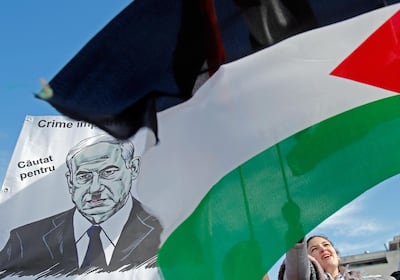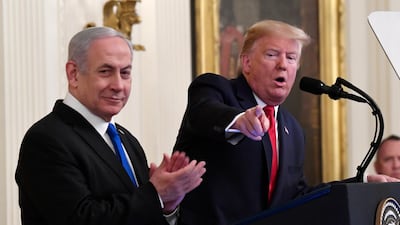In the twilight of its empire, and having exhausted all possible solutions in Mandatory Palestine, Britain announced in February 1947 that its more than quarter of a century of rule in Palestine would end and that the matter would be turned to the newly-formed United Nations. The US, which backed the Zionist ambition to establish a Jewish state in Palestine, welcomed the move. Former US President Harry Truman, who was facing an uphill battle for his election bid in 1948, had to court Jewish-American votes and campaign contributions.
Since then, the US has maintained a perennial engagement with the conflict. With the unveiling in January of US President Donald Trump’s so-called “deal of the century” – which has been rejected by the Palestinians in its entirety as well as the Arab League – the US can no longer pretend to be an honest broker that can bring a historical reconciliation between the parties. America has thus reached its British moment.
The US has tried repeatedly to achieve peace between Israelis and Palestinians. Its continued failure is not for lack of trying. Washington has shown itself to be rather successful in building relationships between Israel and other Arab states. When it comes to the Palestinian issue, however, it has floundered.
The first peace between Israel and an Arab country came with the Camp David Accords in 1978 when Israel and Egypt signed a treaty that provided a framework for a comprehensive settlement. The framework provided autonomy for the Palestinians. The latter rejected it because it did not offer them a path to statehood.
Shepherded by then-US President Jimmy Carter and his administration, the Israel-Egypt peace treaty only took a year and a half of negotiations before it was signed. Similarly, the US aided Jordan and Israel to resolve their differences in 1994, when then-US President Bill Clinton oversaw the signing of the Israel-Jordan peace treaty, also after relatively short negotiations.

The invasion of Kuwait in 1991 presented another chance for Washington to act as a mediator in the region and resolve long-running conflicts in the post-Soviet era. Meanwhile, in Israel, former prime minister Yitzhak Rabin’s left-leaning government was elected a year later, opening the door for new negotiations in Oslo. Those negotiations concluded with the signing of the Oslo Accords in 1993, a pivotal moment in Palestinian history when the Palestine Liberation Organisation and Israel mutually recognised one another. But paradoxically, the prospect of peace polarised Palestinians and Israelis alike. The peace euphoria was cut short when an extremist Israeli assassin’s bullet struck Mr Rabin dead two years after shaking hands with PLO leader Yasser Arafat at the White House. Today, Palestinian leadership is divided between the PLO and Hamas, an Islamist faction that controls Gaza.
That Israel has been headed by hardliner Prime Minister Benjamin Netanyahu almost continuously for the past decade has also hindered any serious prospect for peace. Mr Netanyahu has run on a far-right platform of hate towards Arabs and minorities to secure the top job in Israel. This rhetoric has only served to strengthen radical Palestinian groups such as Hamas and Islamic Jihad at the cost of the moderate faction, Fatah, the Palestinian authority. These political tensions are further polarised by foreign actors such as Qatar, Turkey, and Iran, which have weaponised the suffering of Palestinians to extend their influence in the region.

Today, the US shed all pretences of being an honest broker in this conflict and has now publicly sided with Israel. In such circumstances, it is no wonder that US President Donald Trump’s efforts for peace led to a cul-de-sac.
The author Aaron David Miller, an old hand in the peace process, made a confession in a piece in 2005: “For far too long, many American officials involved in Arab-Israeli peacemaking, myself included, have acted as Israel's attorney, catering and coordinating with the Israelis at the expense of successful peace negotiations.” With such credentials, the US could not and would not be able to bridge the gap between the parties in the conflict.
Unsuccessful American attempts at peace seem to stem from a series of policies that could only be described as one-sided. These failures prove that the US alone cannot be the steward of a complicated peace. Resolving the Israeli-Palestinian conflict requires a will to change the status quo from both parties, as well as a new mediator, perhaps in the form of a neutral, international organisation, such as the UN.
Albadr Alshateri is a former professor at the National Defence College in Abu Dhabi


